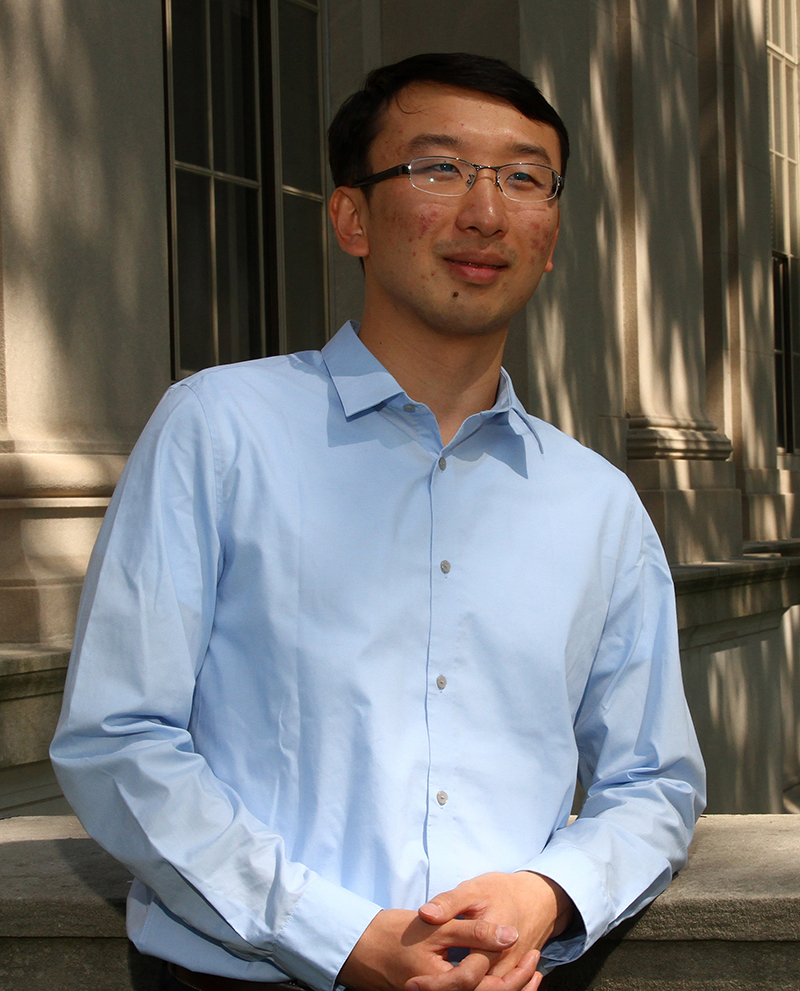Yufei Zhao
Associate Professor of Mathematics, 2022-Present
Research: Extremal, probabilistic, and additive combinatorics
Website: http://yufeizhao.com/

When I was eleven, my parents and I emigrated from China and settled in our new home in Toronto, leaving behind all friends and family, and moving to a foreign land where we didn’t even understand the language. I distinctly remember the first few days of my life in Toronto. We arrived during Canadian Thanksgiving, and on our first morning we walked on empty streets seemingly forever before we found a store that was open and sold food. The following day I was dropped off at the neighborhood elementary school, where I did not understand a word of what anybody said to me. I came home crying from my first day of school. That moment, it felt as if everything I’ve previously learned in school was suddenly turned into ash. One thing that held my confidence together, right then and also for years to come, was mathematics. Even so, my love of math was often a point of mockery among my elementary and middle school peers in Toronto (I remember even some teachers telling me to spend less time on math).
I attended my first math camp while in high school. For the first time since moving to the new country, I felt like I belonged. It was eye opening. I met friends who shared my interests. They encouraged me and inspired me to jump even higher. After I went home, I scoured the internet for math resources, kept a large binder of my favorite handouts, and spent the summer reading and working through the exercises one page at a time. No teacher. No coach. Just myself crawling through the web to satiate my mathematical appetite. I eventually climbed my way up in math competitions, which led me to an incredibly supportive community, including many long-lasting friendships.
My love of math also brought me to MIT, my dream school. It is here that I stayed for my undergraduate, PhD, and now as a faculty member. I love this place. There is always so much energy in the air. There are so many people who are passionate about mathematics, no matter what their background is or which path they took to get here. It is at MIT that I felt I truly belonged.
I’ve received a lot of valuable mentorships when I was an MIT student. Now that I’m on the other side, and even teaching the same first-year seminar that I once took as a student, it means a lot to me to provide the same high-quality mentorship to the next generations of students.
As an undergraduate, at times I felt the peer pressure to overload myself with the most advanced classes somehow as if to prove myself among my peers. At the time, it seemed as if the most admirable goal among my friends was to take algebraic geometry as early as possible. Was success measured by how many graduate classes one can take in a semester?
Looking back, this competitive one-upmanship seemed rather pointless. When I took too many classes, I did not have the time to appreciate what I was learning. I spent weeks after weeks trying to keep up with homework assignments.
There was one subject, combinatorics, that kept drawing my attention. Some of my best memories were those times spent playing around with combinatorics problems, obsessed in my hunt for the solution. The subject spoke to my heart. I ended up pursuing combinatorics for my graduate research. Mathematically, I’ve been happy ever since.
Each year, I advise a new group of super ambitious first-year MIT undergraduates. I always begin with the same message, to encourage them to focus on a few things and really appreciate them, rather than overloading and taking on too much. I tell them that it is tempting to maximize the number of classes taken, whereas they should aim to maximize learning. These two are not the same. The former is more easily quantifiable, whereas the latter is what actually matters.
For me, mathematics is a place of a sanctuary. In my early days, mathematics got me out of discouraging environments and allowed me to hold on to my confidence. Later on, I found a subject that I couldn’t stop thinking about, and it also got me ahead in my career. Even these days, my most blissful moments come when I can tune everything out and just focus and think about my favorite math problem.
